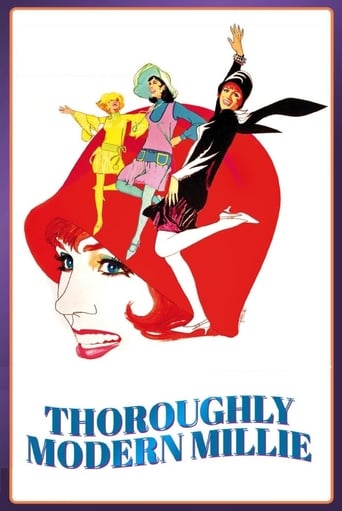eddy-love
I bought this movie for a dollar. My wife and I looked forward to watching it so we put it last Saturday afternoon. About 40 minutes into the movie we looked at each other and agreed to fast forward to see what else happens. Didn't help. The movie made no sense. For the quality of actors and actresses in this movie none of them were any good. Not their fault - the directors fault. The dumbest scenes were the elevators scenes where they had to dance to get the elevator to move. Come on. Really? Mary Tyler Moore's part was a shocker to me because she normally chooses good movies to star in and she blew it with this one. The dance numbers were no good. I wouldn't recommend this film to anyone to watch. Glad I only spent a buck.
A_Different_Drummer
Just had a chance to re-watch beginning to end.What a difference a half-century makes! First Carol Channing steals the whole film, more or less playing the image or persona of Carol Channing that she herself created. She was 46 at the time and shows the energy of someone half her age. She won various awards and nominations and deservedly so. Her performance may be the only thing memorable here.Reviewers like to talk about whether a film holds up over time? This one most assuredly does not. Lots of star power wasted on a horrendous too-cute-for-words script that goes nowhere.In the 60s Julie Andrews could do no wrong. In fact, if her entire resume consisted of nothing but Sound of Music and Mary Poppins, she could rest on those laurels. She is wasted here, never connects with the character, and having her boss call her "John" is a weak joke that wears out fast and starts to grate.Mary Tyler Moore was between the DVD show and her own hit show. Into this lull comes an enormously forgettable performance. "Miss Dorothy" is less than one dimensional, almost a transparent character.It is sad that the second Act degenerates into a slapstick about (ugh!) white slavery. That detracts from little goodwill was established in the first Act.
Robert J. Maxwell
It's 1922 in New York. Tribal customs of grooming and dress are colorfully pierced. Julie Andrews' bosom is too large, so her drooping pearl necklace doesn't droop symmetrically. Mary Tyler Moore is her hotel mate in a girls-only establishment. Very proper, you know. Except that the concierge, Beatrice Lilly, is in cahoots with the likes of Philip Ahn, whose business is kidnapping naive young ladies and selling them into a white sex slave trade. Or something.The costumes are varied and rich, and the two principals are gorgeous. The musical arrangements are neatly done too, mostly but not entirely renditions of period tunes like "Charmaine" and "Baby Face". The latter is Andrews' paean to John Gavin, who ought to be ashamed of himself, although he handles his assignment here well enough. What a handsome guy. He even obtained political prominence under Reagan, being appointed ambassador to Mexico. It was one of those rare ambassorships that was justified, since Gavin's mother was from a prominent Mexican family, Gavin spoke fluent Spanish and Portugese and had graduated in Latin American history at Stanford. A success at everything he tried, and Julie Andrews' true love, to boot. I hate his guts.Sorry. I know that was a little off topic, but if you think that was a bit on the random side, you should see this movie. I couldn't tell where it was going. The general idea, of course, is from "Singin' in the Rain." A shift in the cultural paradigm. But then there are hints of other comedies. Andrews glances at the camera and makes a moue when disappointed. First time I saw that fourth-wall device in a modern movie was in "Tom Jones", released three years earlier. (That's not counting Laurel and Hardy.) The comedy is fast, there are a lot of songs, and Julie Andrews is a sonorous soprano. But I found it dull. There are snippets of "The Great Race," which appeared two years earlier. Stuff seems to happen for no reason other than to add some dash to the story. Sometimes it works, sometimes not.Worst of all, though it has a lovely English lady as a singer, there is only a smattering of dance -- and it's not original or exhilarating. If you're going to transpose "Singin' in the Rain" from 1929 to 1922, the least you can do is use a choreographer who knows how to stage a dance. Anybody can sing, but dancing is HARD WORK. Where is Gene Kelly when you need him? Or Bob Fosse? A celebration at a Jewish wedding -- one of those events that comes out of nowhere -- begins with promise but ends with Andrews belting out a song in Yiddish while the celebrants to an ordinary ring dance.A disappointment, but a fast and vibrant one. I imagine a lot of people will have fun watching it. The kids might not get some of the racier gags, but then they're not very racy so the kids won't be missing much.
Ed
Saw most of this again on TCM this evening after seeing it complete many years ago.The cast was charming and carried off the clichés and cartoonish adventure with great aplomb. The villainous Mrs. Meers was played by the great comedienne, Bea Lillie and the rest of the cast especially the women (Julie Andrews, Mary Tyler Moore and Carol Channing), were excellent as they continued to prove in their later careers.Of course the two "orientals" were extremely racist caricatures (played by Jack Soo and Pat Morita) up there with Mickey Rooney in Breakfast at Tiffanys in that respect.But much of it went on far too long and this was further drawn out by the endless "Intermission" with Julie doing the singing throughout, and the unbelievably endless closing credits.




